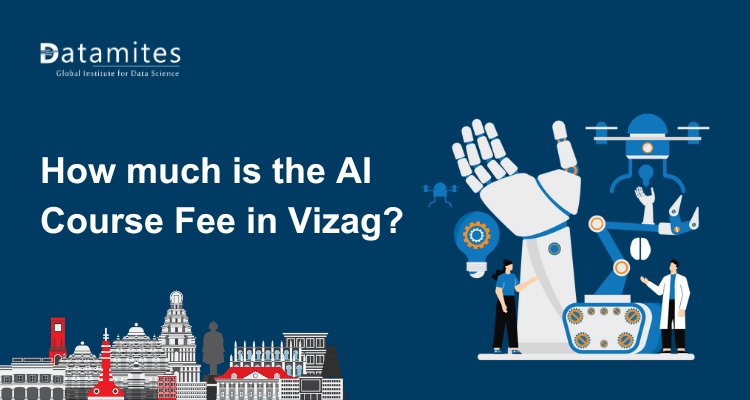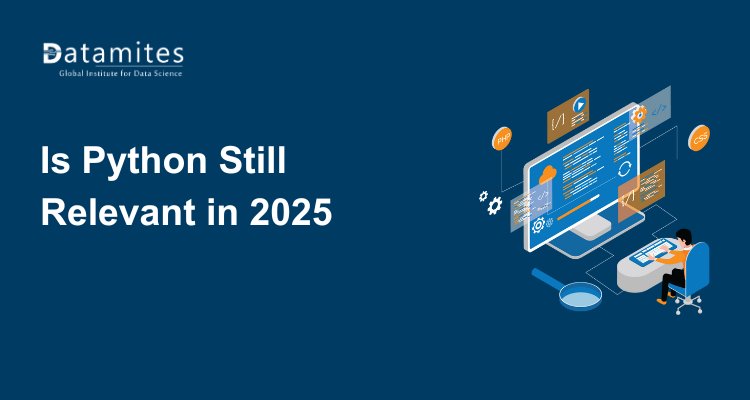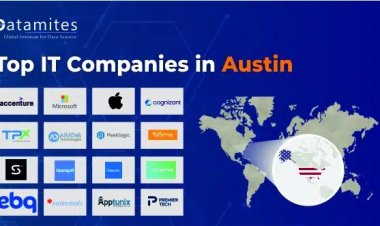Top 5 AI Tools for Beginners to Get Started with Machine Learning
Getting started with Machine Learning can feel overwhelming, especially for beginners without a technical background. Fortunately, there are several beginner-friendly AI tools that simplify the learning process and make it accessible to everyone.
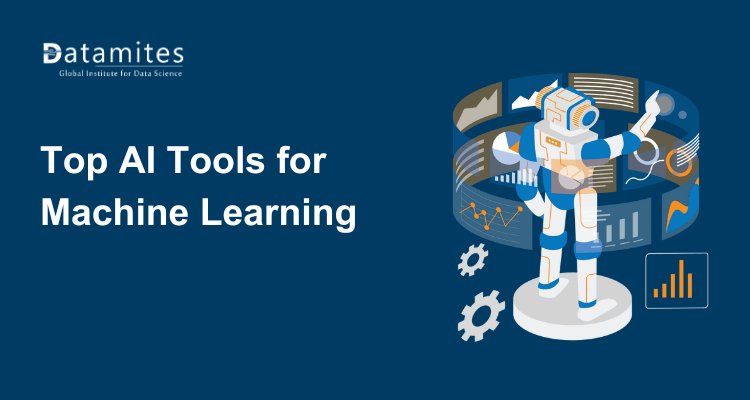
Are you curious about diving into the world of Machine Learning but don’t know where to start? With the rapid growth of Artificial Intelligence (AI), there’s never been a better time to learn how these cutting-edge technologies are reshaping industries and everyday life. In this blog, we’ll explore the top 5 AI tools that are perfect for beginners, helping you get hands-on experience and kickstart your career in Machine Learning. Let’s dive in!
What is Machine Learning (ML)?
Machine Learning (ML) is a subset of Artificial Intelligence (AI) that enables computers to learn from data and improve their performance over time without being explicitly programmed. Rather than relying on hardcoded instructions for every task, ML systems can automatically identify patterns, make decisions, and predict outcomes based on the data they receive.
At its foundation, ML utilizes algorithms that process large volumes of data, uncover hidden patterns, and refine their actions over time. These algorithms become more accurate as they are exposed to more data, which makes both the quality and quantity of data critical to the success of ML projects.
According to ABI Research, Generative AI is expected to be the fastest-growing AI framework, with a projected compound annual growth rate (CAGR) of 49.7% during the forecast period. Major growth opportunities in this area include foundation models, optimization software, and model deployment tools.
ML powers a wide range of everyday applications, such as spam filters, movie and product recommendation systems, chatbots, and facial recognition technology. The best part is that thanks to beginner-friendly AI tools, you don’t need a Ph.D. in data science to start experimenting with and building your own machine learning models.
Refer these below articles:
- Understanding Machine Learning: Basics for Beginners
- The Importance of Feature Engineering in Machine Learning
- Getting Started with Machine Learning
Why is Machine Learning Important Today?
Machine Learning plays a crucial role in today’s world as it drives the technology behind many tools and services we use daily, while also enabling organizations to make smarter and faster decisions. According to Fortune Business Insights, the global Natural Language Processing (NLP) market, which was valued at USD 24.10 billion in 2023 and is projected to reach USD 158.04 billion by 2032, growing from USD 29.71 billion in 2024. Here are some key reasons why machine learning is so important in the modern world:
1. Data Explosion
We’re generating massive amounts of data every second, from smartphones, social media, IoT devices, online transactions, and more. ML helps make sense of this data by identifying patterns and extracting insights automatically.
2. Automation of Complex Tasks
ML enables automation of tasks that traditionally required human intelligence, such as image recognition, language translation, fraud detection, and even medical diagnosis. This not only speeds up processes but also reduces errors.
3. Personalization
Whether it's Netflix recommending your next show or Amazon suggesting products, ML is behind the personalized experiences that drive user engagement and customer satisfaction.
4. Business Optimization
Companies use ML to forecast demand, detect anomalies in financial transactions, optimize supply chains, and improve customer service through chatbots and predictive analytics.
5. Foundation of AI
ML is the core engine of artificial intelligence (AI). From autonomous vehicles to virtual assistants like Siri or Alexa, machine learning enables systems to learn and improve over time.
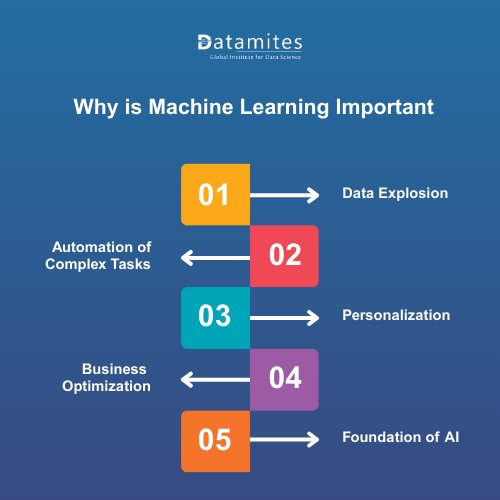
Core Concepts in Machine Learning
Understanding the core concepts of Machine Learning (ML) is essential, whether you’re a beginner or looking to refresh your knowledge. According to reports from Statista, the United States holds the largest machine learning market in the world in 2024, valued at over 21 billion U.S. dollars. In contrast, India, despite its large population, has a market size comparable to that of major European countries.
1. Supervised Learning
- Definition: The algorithm learns from labeled data — data that already includes the correct answer.
- Goal: Predict outcomes for new, unseen data.
Examples:
- Classification (e.g., spam detection)
- Regression (e.g., predicting house prices)
2. Unsupervised Learning
- Definition: The algorithm learns patterns from data without labels.
- Goal: Discover hidden structures in data.
Examples:
- Clustering (e.g., customer segmentation)
- Dimensionality Reduction (e.g., PCA)
3. Reinforcement Learning
- Definition: An agent learns to make decisions by interacting with an environment and receiving feedback in the form of rewards or penalties.
- Goal: Maximize cumulative reward.
Examples:
- Game-playing AI (e.g., AlphaGo)
- Robotics and self-driving cars
4. Features and Labels
- Features: The input variables (e.g., height, weight, income).
- Labels: The output or target variable (e.g., healthy/unhealthy).
5. Training and Testing
- Training: Feeding data to the algorithm so it can learn patterns.
- Testing: Evaluating the model’s performance on unseen data to check how well it generalizes.
How to Choose Machine Learning Tools
Choosing the right Machine Learning (ML) tools depends on your goals, experience level, the type of data you're working with, and the project requirements. Let’s dive into the top 5 AI tools for beginners to get started with machine learning.
Tool 1: Google Colab
Google Colab is a free, cloud-based Jupyter Notebook environment that supports Python and allows you to write and execute code in the browser. It’s perfect for learning machine learning without installing anything.
- Offers GPU support for deep learning
- Integrated with Google Drive
- Great for experimenting with Python ML libraries like TensorFlow, Keras, and Scikit-learn
For beginners taking their first steps in ML, Google Colab provides a supportive environment to test models, visualize results, and collaborate with peers.
Tool 2: Scikit-learn
Scikit-learn is a Python library that offers a wide range of simple and efficient tools for data mining and machine learning. It’s beginner-friendly, well-documented, and widely used in the industry.
- Supports classification, regression, clustering, and dimensionality reduction
- Easy-to-use API for building models quickly
- Ideal for supervised learning algorithms like decision trees, SVMs, and logistic regression
Many tutorials and courses feature Scikit-learn as a foundational ML tool. It’s a great choice for those who want hands-on coding experience.
Tool 3: Teachable Machine (by Google)
Teachable Machine is a web-based tool by Google that lets you build ML models without writing code. You can train models to recognize images, sounds, or poses using your webcam or microphone.
- No coding required
- Instant model training with live data
- Great for interactive projects and classroom demos
Teachable Machine is perfect for students and creative thinkers who want to explore AI in a fun and visual way. It’s an engaging way to grasp ML fundamentals without getting into code right away.
Tool 4: KNIME
KNIME (Konstanz Information Miner) is an open-source, GUI-based platform that allows you to design machine learning workflows using drag-and-drop nodes.
- No coding needed
- Powerful for data preprocessing, transformation, and modeling
- Supports integration with Python and R for advanced users
KNIME is a great choice for beginners who prefer visual programming over code but still want to perform sophisticated ML tasks. It's widely used in business analytics and research.
Tool 5: TensorFlow Playground
TensorFlow Playground is an interactive visualization tool for understanding neural networks. It allows you to tweak network architectures, adjust learning rates, and experiment with real-time outputs.
- Visual interface for experimenting with deep learning
- Ideal for understanding how neurons, layers, and activation functions work
- Immediate visual feedback on changes
Read these below articles:
According to Grand View Research, the global artificial intelligence industry is projected to reach a revenue of approximately USD 1,811,747.3 million by 2030. While TensorFlow Playground may not serve as a complete development environment, it is an invaluable tool for gaining a deeper understanding of the intuition behind deep learning concepts.
Machine learning is an exciting and rapidly evolving field. As a beginner, your journey should start with easy-to-use tools that provide both understanding and practical experience. Whether you want to learn through code (Google Colab, Scikit-learn), visuals (Teachable Machine, KNIME), or interactive demos (TensorFlow Playground), there’s something for every learning style.
Start small, build simple models, and gradually progress. In no time, you’ll move from beginner to advanced ML practitioner. These top AI tools for beginners make learning engaging, hands-on, and accessible.
DataMites provides a comprehensive Machine Learning Course in Bangalore programs tailored to all proficiency levels, from beginners to advanced learners. These courses are thoughtfully structured to deliver a strong foundation in theoretical concepts while emphasizing hands-on practical skills, preparing participants effectively for careers in machine learning.
DataMites courses were accredited by internationally recognized bodies such as IABAC and NASSCOM FutureSkills. In addition to quality training, Datamites provide comprehensive support services including resume building, interview preparation, and placement assistance to help learners successfully transition into roles within the data and AI industries.
Pursuing a Machine Learning course in Pune can be a highly rewarding step for individuals aiming to build a career in data science and artificial intelligence. Pune, being a growing tech hub, offers a vibrant ecosystem with ample learning resources, industry exposure, and job opportunities in the ML domain. A well-structured course in this city equips learners with both theoretical understanding and practical skills, helping them stay competitive in the job market.

